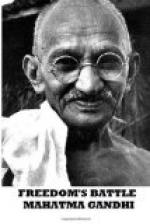* * * * *
We have given above the terms of the Turkish treaty as indicated in Router’s messages. These reports are incomplete and all of them are not equally authenticated. But if these terms are true, they are a challenge to the Muslim demands. Turkish Sovereignty is confined to the Chatalja lines. This means that the Big Three of the Supreme Council have cut off Thrace from Turkish dominions. This is a distinct breach of the pledge given by one of these Three, viz., the Premier of the British Empire. To remain within the Chatalja lines and, we are afraid, as a dependent of the Allies, is for the Sultan a humiliating position inconsistent with the Koranic injunctions. Such a restricted position of the Turks is virtually a success of the bag and baggage school.
It is not yet known how the Supreme Council disposed of the rich and renowned lands of Asia Minor. If Mr. Lloyd George’s views recently expressed in this respect have received the Allies’ sanction—it is probable—nothing less than a common control is expected. The decision in the case of Smyrna will be satisfying to none, though the Allies seem to have made by their arrangement a skillful attempt to please all the parties concerned. Mr. Lloyd George, in his reply to the Khilafat Deputation, had talked about the careful investigations by an impartial committee and had added; “The great majority of the population undoubtedly prefer Greek rule to Turkish rule, so I understand” But the decision postpones to carry out his understanding till a period of five years.
* * * * *
When we come to the question of mandates, the Allied Powers’ motives come out more distinctly. The Arabs’ claim of independence was used as a difficulty against keeping Turkish Sovereignty. This was defended in the of self-determination and by pointing out parallels of Transylvania and other provinces. When the final moment came, the Allies have ventured to divide the spoils amongst themselves. Britain is given the mandate over Mesopotamia and Palestine and France has the mandate over Syria. The Arab delegation complains in their note lately issued expressing their disappointment at the Supreme Council’s decision with regard to the Arab liberated countries, which, it declares, is contrary to the principle of self-determination.
* * * * *
So what little news has arrived about the Turkish treaty, is uniformly disquieting. The Moslems have found sufficient ground to honour Russia, more than the Allies. Russia has recognised the freedom of Khiva and Bokhara. The Moslem world, as H. M. the Amir of Afghanistan said in his speech, will feel grateful towards Russia in spite of all the rumours abroad about its anarchy and disorder, whereas the whole Moslem world will resent the action of the other European nations who have allied with each other to carry out a joint coercion and extinction of Turkey in the name of self-determination and partly in the guise of the interest of civilization.




